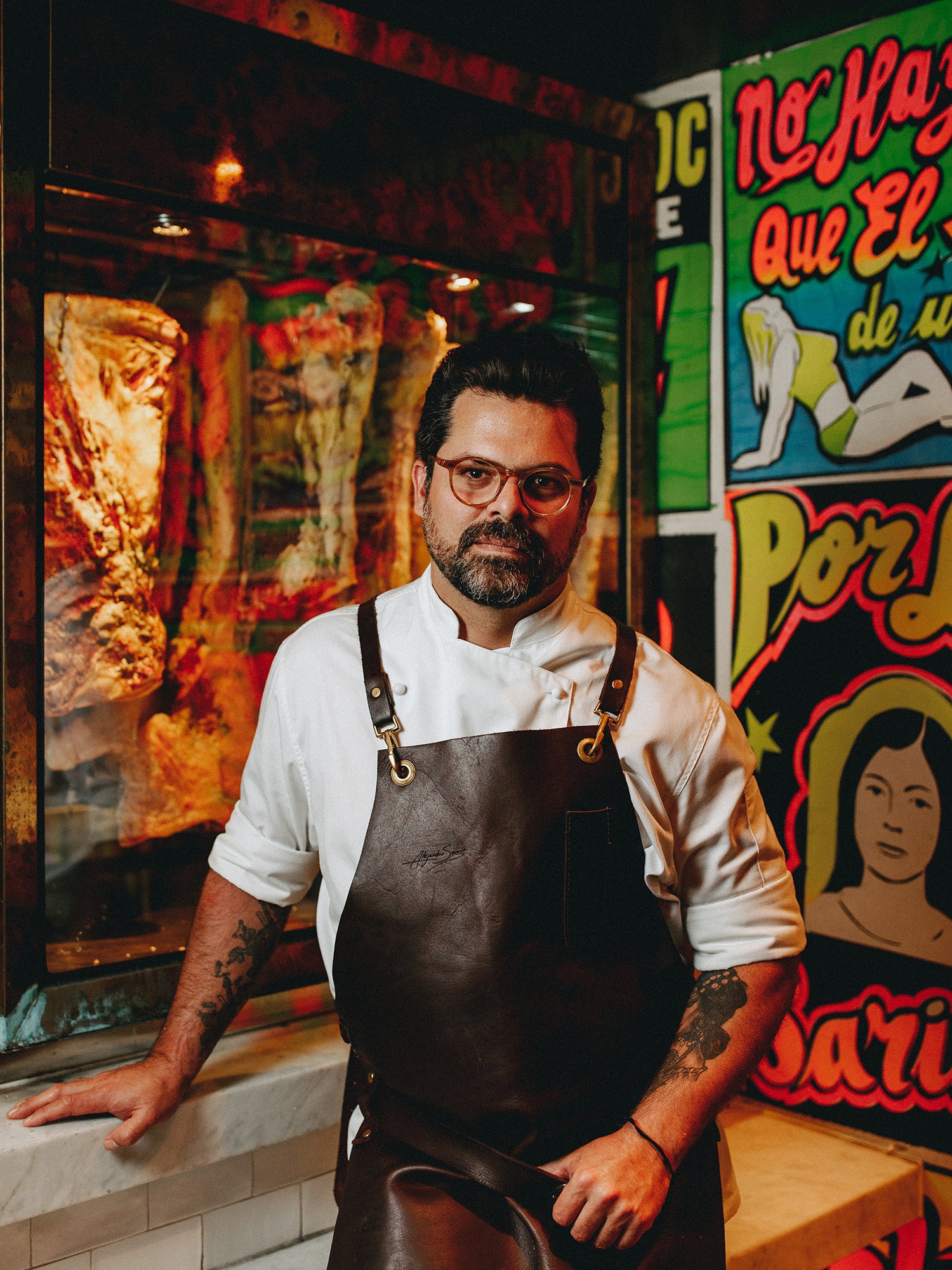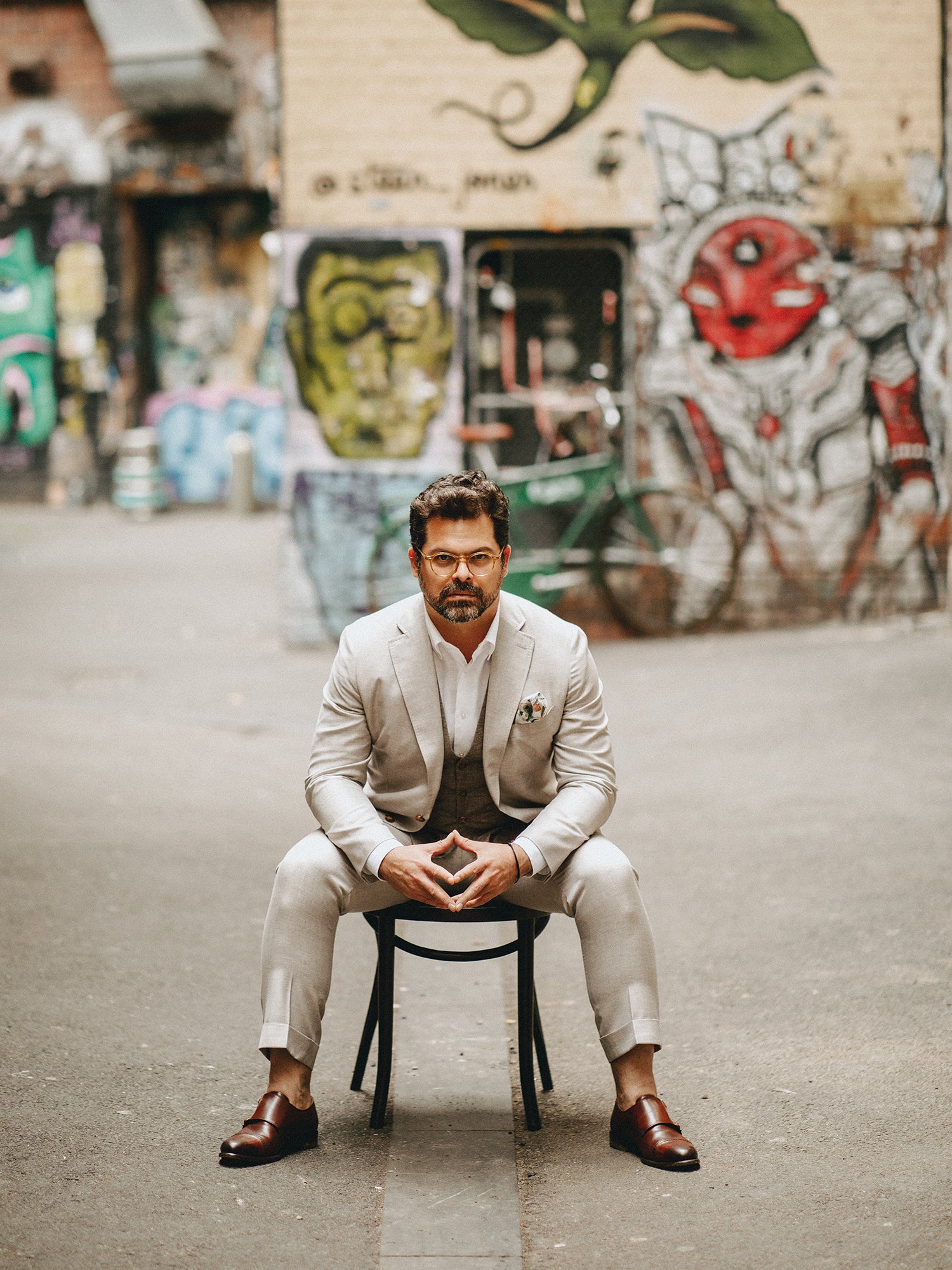TOHM: Alejandro Saravia
Slicing into the gleaming flank of a 10kg red emperor, Alejandro Saravia stops mid-incision to consider exactly how he got here. More specifically, how did a chef from Lima wind up running a restaurant down Melbourne’s ACDC Lane?

TOHM: Alejandro Saravia
On reflection, Alejandro grins, his original plan for Australia has been a total failure. “My whole idea really in coming here was to party as much as I could, do a bit of surfing and work in a café by the beach and embrace that Australian “no worries” thing,” he says while casually dicing the fish into perfect cubes.
The reason this lifestyle appealed back then was that Alejandro was completely burnt out. The grind of working in a series of top-end European restaurants– including Heston Blumenthal's Fat Duck – had taken its toll. “I’d got to a point where I didn't know if the effort and all the sacrifices were worth it,” he says.
It soon transpired that Alejandro was hopelessly ill-suited to the life of a Bondi beach-bum and, in person, you can understand why. Black haired and heavily bearded, he crackles with energy, passion and ideas. In short, he’s not a man you can picture sitting idle for a single minute.

It’s therefore not surprising that, 13 years on, Alejandro has become something of a culinary powerhouse whose impact on the Australian food scene continues to grow and grow. Credited with bringing Peruvian cuisine to Oz, he currently runs two restaurants - Pastuso, where we are now in the heart of Melbourne - and Uma, another restaurant in Perth. Later this year, he’ll launch another wildly ambitious venture – a vast three-storey venue on Collins Street (more on that later). Only 37 years old with a Spanish wife and two young sons, you wonder how on earth he packs it all in.
Reflecting on his arrival in Sydney at the end of 2006, Alejandro concedes his plan for a more laid-back lifestyle quickly went awry. He did find a more low-key job in a Manly café, but coming from a three star Michelin restaurant, his efforts to apply similarly exacting standards didn’t go down well. “I was sacked,” Alejandro smiles. “It wasn't my environment.”
But what that brief taste of café culture did was to reignite his passion for fine dining. Alejandro proceeded to work at Bennelong, Pier and Sails – top Sydney restaurants that each, coincidentally, also command jaw-dropping views. It was now that his immersion in Australian food culture began in earnest. Amid the clang and bustle of daily service he got a crash course into the range and quality of local ingredients while also discovering new varieties of seafood from sweetly flavoured snapper to hapuka’s juicy white flesh.
At the same time, Alejandro quickly clocked that he’d landed in a nation that was refreshingly open to initiative. “What I realised was that Australia is a first-world country with the opportunities of a developing country," he says.
If he was going to stay here, Alejandro figured, he might as well try and launch his own thing. The question was what direction would this project take? “Until then I'd never cooked Peruvian cuisine in my life,” he reveals. “I was completely trained in French cuisine and fine dining. I hadn’t ever really been interested in my own country's food.”
A trip to Movida, Frank Camorra’s brilliant Melbourne tapas joint, provided a timely source of inspiration. Previously, Alejandro believed that attempts to replicate a cuisine outside the country of origin were doomed to the failure. “In my opinion, there's no traditional food outside the country because the ingredients are not the same, the environment is not the same, and there's a lot of other factors that influence the flavours.”
Movida showed how you could take an alternative approach by remixing classic dishes with fresh ideas and local ingredients. “I thought: “I'm not going to do traditional. I'm going to use my memories of growing up in Peru and enjoying the cuisine and then create my own interpretation of it."

In 2011, Alejandro opened Morena in Surry Hills - the first Peruvian restaurant to be featured in the Sydney Morning Herald Good Food Guide. In 2014, he moved to Melbourne and opened Pastuso down a hidden nook in the CBD. Today, at 12.30pm on a Tuesday, the restaurant is already buzzing with orders flying in for bowls of glistening ceviche, hearty alpaca ribs and, of course, multiple rounds of pisco sours.
“We wanted to create a Peruvian Embassy in Melbourne that doesn't deal with bureaucracy and politics,” Alejandro says while happily surveying his domain. “What we deal in here is flavours and ingredients.”
Ingredients are not surprisingly an obsession for Alejandro. Indeed his passion for sourcing the best local produce has largely inspired his next project. Running a Melbourne restaurant, much of his supply comes from Gippsland, the rural region of south-east Victoria. “It’s a major food region,” Alejandro insists. “It’s where a lot of people source amazing beef, dairy, fruit and veg, seafood.”
His interest in the area redoubled when he became a dad. As a proud Peruvian, national identity is vitally important to Alejandro. But as an ex-pat who’s rebuilt his life in Oz, he was keenly aware that his sons would develop a very different sense of self.
“I started to think about how they’re not Peruvian or Spanish – they’re Australian,” he says. “So it’s my duty as a father to help them build that identity by researching the regions they’re from, to pass on that understanding of the area and develop their sense of belonging.”

Exploring Gippsland’s rolling hills, Alejandro was gobsmacked by what he found. Speaking to the local farmers, producers and craftsmen, he uncovered farm fresh cheeses and organic vegetable farms, cool-climate wines and small-batch craft gins. Nestling amid the blue gums lurked an outrageous variety of great food and drink. Alejandro’s new mission became to showcase it to the world.
“The area was a hidden gem,” he insists. “I couldn’t understand why anyone else hadn’t done anything to promote that region. So I thought” ‘OK, then I’ll be the one.”
The result will be Farmer’s Daughter, the multi-storey restaurant that’s set to open at 80 Collins St in July. Downstairs will be a relaxed, deli-style eatery focused on seasonal products - think cured sardines from the Lakes Entrance or alpine trout fillet with Warrigal greens. Upstairs will offer a “formal but fun” dining experience with the kitchen celebrating the art of fire cooking with meat and fish grilled over local wood (“regional Victoria is all about the campfire,” Alejandro explains.) Last but not least, upstairs will be home to a rooftop bar that will shake up cocktails made with local spirits and native herbs.
Understandably, given the scale of this venture, Alejandro is evangelical about the value of embracing your regional food community. It’s not just about supporting your area, he insists. Harnessing the local know-how is one of the easiest ways to ensure that you eat more delicious food.
“You need to talk to your local fruit vendor, butcher and fishmonger. Go to your farmers’ market and get to know them,” he urges. “These people are experts – their families have often been in their industries for generations. They can teach you what to choose and when to source.”
Superior ingredients will also simplify your efforts in the kitchen. When asked for a suggestion to help the average home cook raise their game, Alejandro is a big believer in nailing the basics. “Less is more,” he says. “If you overcomplicate dinners and attempt, say, a 20-course degustation then you’ll probably fail.”
When having people over, his advice is to work on your roasts. A perfectly seared joint of beef on the bone or a whole roasted fish is relatively easy while, significantly, you can also prepare most of the meal in advance. That’s a vital consideration, he says, because when entertaining you don’t want to be stressing in the kitchen. “It’s all about sharing a table, sharing food and sharing stories.”
As if to reinforce this sentiment, Alejandro promptly insists that the photographer, art director and I sit down in Pastuso right now to join him for lunch with his wife. Refusing to take “no” for an answer, he orders a round of pisco sours.
Twenty minutes later, chewing thoughtfully on a grilled skewer of wagyu beef, Alejandro looks contentedly at the surrounding tables full of diners “I’m so privileged to do what I do,” he says quietly. “I don’t consider this work - it’s my lifestyle.”




